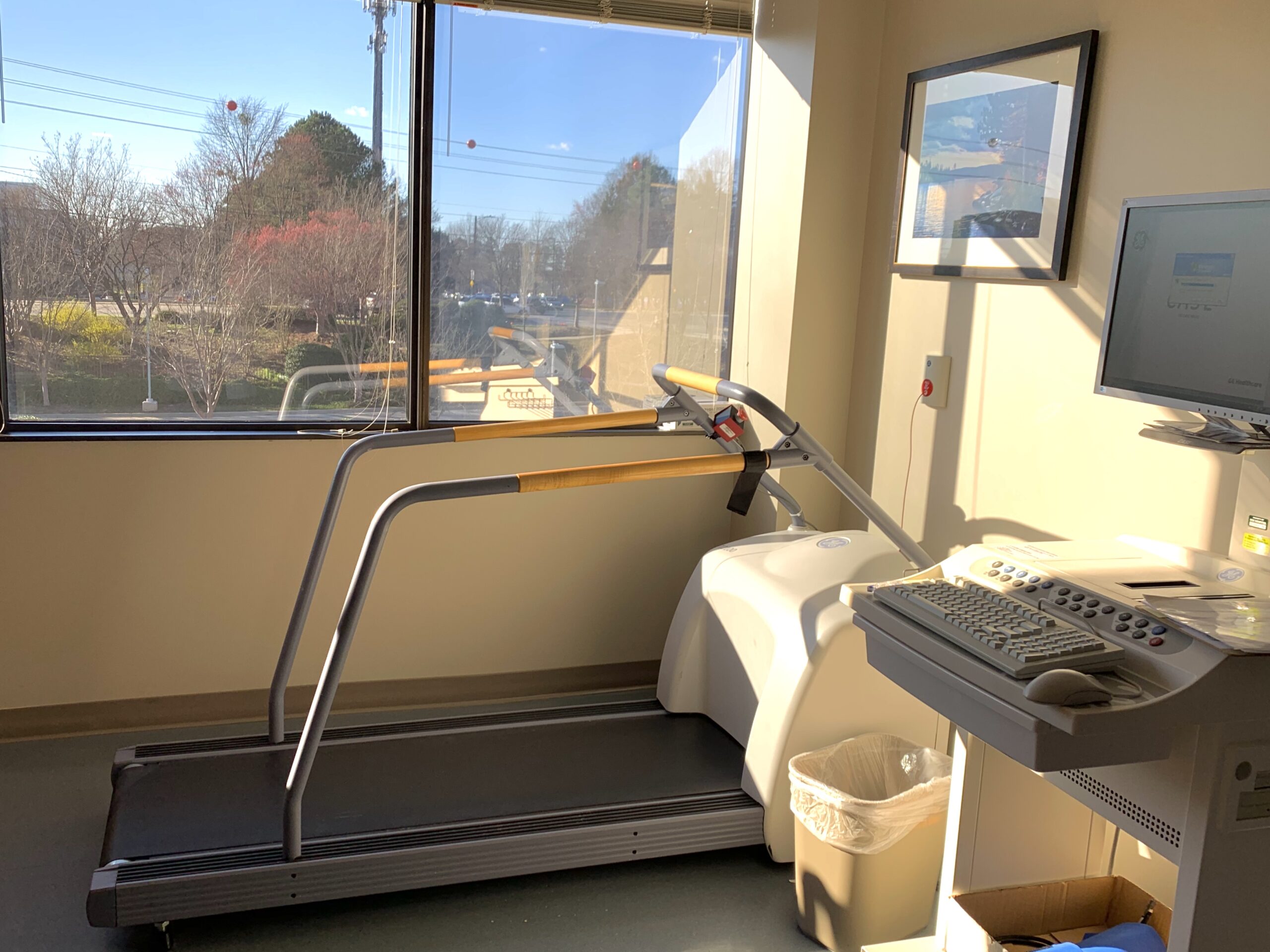Stress Test
A stress test is typically performed to determine if your symptoms, such as chest pain or shortness of breath, are likely to be the result of coronary artery disease. Less often, a stress test can also be performed to assess your overall cardiovascular fitness, or to assess the effect of exercise on your heart rhythm.

What You Need to Know Before Your Stress Test
To ensure the best experience possible, please note the following important points:
Have an empty stomach
Do not eat or drink anything other than water for the six hours prior to your test.
Avoid caffeine
Avoid caffeine-containing beverages (coffee, tea, soda) and foods (chocolate) for at least 12 (preferably 24) hours before your test.
Skip certain medications
If you take any of the following medications, please skip them on the morning of your test: metoprolol (Toprol), carvedilol (Coreg), atenolol (Tenormin), propranolol (Inderal), nebivolol (Bystolic), diltiazem (Cardizem), verapamil (Calan).
Video Explainers
Stress testing: overview. This video provides a basic introduction to stress testing in general, and explains how it all works, regardless of which type of stress test you’re having.
Stress echocardiogram. This video explains how the test works, what it’s looking for, and what you should expect.
Nuclear stress test (myocardial perfusion scan). This video explains how the test works, what it’s looking for, and what you should expect.
Abnormal stress test: what next? If your stress test indicated a problem, this video explains what you should expect to happen next.
More Details
What is coronary artery disease, and how does a stress test detect it?
The muscular walls of the heart need oxygen-rich blood to function. The blood inside of the heart’s chambers do not supply oxygen to the heart muscle itself. Instead, special arteries on the surface of the heart, known as the coronary arteries, provide the blood flow needed to nourish and sustain the heart.
Over time, plaque can develop within the coronary arteries and partially block the flow of blood. When your heart rate increases, and your heart requires more oxygen-rich blood to function, the diseased coronary arteries become unable to deliver adequate blood fast enough. As a result, you can develop symptoms of chest discomfort, fatigue, shortness of breath, nausea, or more.
If you are regularly experiencing such symptoms, especially when you exert yourself, a stress test can increase the strain on your heart to reproduce your symptoms and assess for signs of inadequate blood flow.
How does a stress test work?
A stress test is performed by a nurse under the supervision of a physician. There are several different ways of performing a stress test, with the best choice depending on your ability to exercise, your overall risk profile, and the question being addressed.
The two main types of stress test are known as an exercise (treadmill-based) stress test, and a pharmacologic (medicine-based) stress test. We typically recommend an exercise stress test unless you are unable to jog because of joint pain or weakness, in which case we recommend a pharmacologic (no exercise) stress test..
What is an exercise stress test?
In an exercise stress test, you will jog on a treadmill until your heart rate reaches a target level. At that point, we will assess blood flow to your heart using an electrocardiogram (ECG) and, in some cases, additional imaging tests.
First, you will undergo a baseline assessment of vital signs. You will then be connected to an ECG machine, which will remain attached for the entire test. Finally, you will be moved to the treadmill.
At the start of the test, the treadmill will be at a walking speed at a ten percent incline. Every three minutes, the treadmill will become steeper and faster.
While you are exercising, your heart rate and ECG will be monitored continuously, and your blood pressure will be checked every few minutes. It is normal for your heart rate and blood pressure to increase, sometimes dramatically, during exercise. You will continue until you reach your limit – either because of fatigue, shortness of breath, chest pain, lightheadedness, leg pain, or some other symptom.
Depending on your level of fitness, you will be jogging or running by the end of the test. Regardless of how long you are able to exercise, the goal is to get your heart rate to a target level (equal to 220 minus your age, then multiplied by 0.85). If you do not reach your target heart rate, the test is considered non-diagnostic. In this case, we may switch to a pharmacologic test (see below).
In most circumstances your exercise time, along with your vital signs and ECG during exercise, are enough. If you have a known history of coronary disease or are at increased risk, however, we typically recommend adding a stress echocardiogram or nuclear scan to maximize the likelihood of detecting a problem.
In a stress echocardiogram, we perform an ultrasound of your heart as soon as you get off the treadmill, while your heart rate is still elevated. We determine if any portion of the heart muscle appears weakened by exercise, indicating inadequate blood flow.
In a nuclear scan, we inject a mildly radioactive chemical into your blood as you approach your exercise limit. This chemical is retained by the heart after passing through the coronary arteries. About 20-40 minutes after your scan, we scan your heart to determine if all parts of the heart received equal amounts of the chemical, or if part of the heart had reduced blood flow.
What is a pharmacologic stress test?
If you are unable to exercise on a treadmill, we recommend a pharmacologic (medicine-based) stress test.
To start, you will undergo a baseline assessment of vital signs. You will also be connected to an ECG machine, which will remain attached for the entire test. We will then inject a medication that “stresses” the heart, and assess the heart’s response using either an echocardiogram (ultrasound) or nuclear scan.
In a pharmacologic stress echocardiogram, we perform a baseline scan of your heart and then infuse a medication known as dobutamine. This medication causes your heart rate to increase, as it would during exercise. You may feel your heart pounding or even skipping beats. We increase the dobtamine dose until your heart reaches the target rate, then we perform an ultrasound to determine if any portion of the heart muscle appears weakened, indicating inadequate blood flow.
In a pharmacologic nuclear scan, we perform a baseline scan of your heart and then inject a medication known as regadenoson. This medication maximizes blood flow through each of the coronary arteries. A few seconds later, we inject a weakly radioactive chemical, which is retained by the heart after passing through the coronary arteries. About 20-40 minutes after your scan, we scan your heart to determine if all parts of the heart retained equal amounts of the chemical, or if the uptake was reduced in part of the heart because of reduced blood flow through a diseased coronary artery.
Is a stress test safe?
A stress test is generally considered a very low risk test. The chance of a serious complication, such as death or a heart attack, is approximately 1 in 10,000.
During a stress test, you may experience chest discomfort. We will immediately stop the test if there is any evidence of damage to your heart. We always have resuscitation equipment on-hand in the extremely unlikely case of an emergency.
If you exercise, you may feel breathless and uncomfortable for several minutes after completing exercise.
If you undergo a pharmacologic stress echocardiogram, you may feel your heart pounding or racing while receiving dobutamine.
If you undergo a nuclear stress test, you may experience shortness of breath, nausea, and/or headache for a few minutes after receiving regadenoson.
When will I get my results?
Your results will be provided via telephone or MyChart within a few days of your test.

